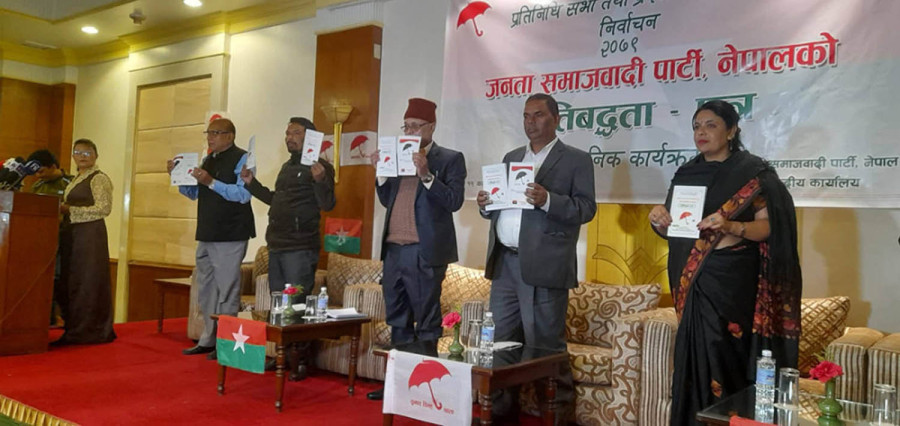National
Janata Samajbadi manifesto fails to focus on citizenship issue
Party leaders, however, say the citizenship issue was mentioned implicitly.
Nishan Khatiwada
Janata Samajbadi Party—the CPN-UML’s electoral partner—on Saturday unveiled its manifesto for the November polls. The party has, surprisingly, not given much importance to the long-standing issue of citizenship in the crucial document.
The manifesto mentions citizenship under the subheading Madheshi Community of the heading National Identity and Rights. “Ensuring national identity and rights to the Madheshi community. Resolving the citizenship issues,” the document reads.
This is the only point that touches on the serious problem of statelessness that many Nepalis have been facing for a long time.
When President Bidya Devi Bhandari rejected the Citizenship bill in September this year, the UML had backed her move while two Madhesh-based parties—Janata Samajbadi and Loktantrik Samajbadi—were in its favour and opposed the President’s decision to block the bill.
The bill was twice passed by both the House of Representatives and the National Assembly. A bill becomes the law only if it gets the presidential seal following endorsement by Parliament.
Party leaders, however, say the citizenship issue was mentioned implicitly.
Prakash Adhikari, the party’s central office chief, claimed that the party leaders have been speaking for resolving the citizenship issues for a long time and have raised other constitutional and political issues in the manifesto to which the citizenship issue is connected.
“The issues of constitutional amendment we raised are also linked to citizenship,” Adhikari told the Post. “It is not true that the issue is not on our priority and also it is not true that we will contest the election concentrating fully on this plank.”
The party said constitutional amendment was needed to change the form of governance, set up federal structures, restructure the legal system as per the essence of federalism, strengthen constitutional bodies, end gender bias on citizenship and clarify the definition of secularism.
According to the manifesto, the party will ensure the right to self-determination in political, economic, social and cultural issues for the Madheshi and indigenous people.
Observers say it is no surprise because the party has already abandoned the Madheshi cause.
“They have already reneged on their commitment to Madheshi issues such as citizenship. They are also aware that they cannot trick the people and get votes for false promises,” said Chandra Kishore, a journalist who has been following Madhesh politics for a long time.
While in power, they failed to lobby to address the long-standing issue of citizenship even though hundreds of thousands citizens are stateless, he said.
In its manifesto, the party has proposed a system of governance with directly elected president and chief ministers.
“Ensuring directly elected president, chief minister and chief of local units as a form of governance,” states the document as the party’s electoral goal.
According to the manifesto, the executive president will form an inclusive cabinet. Moreover, the party has proposed fully proportional federal and provincial elections.
A provision will be ensured in which a person can’t be an executive head for more than two terms, the party promises.




 18.12°C Kathmandu
18.12°C Kathmandu














